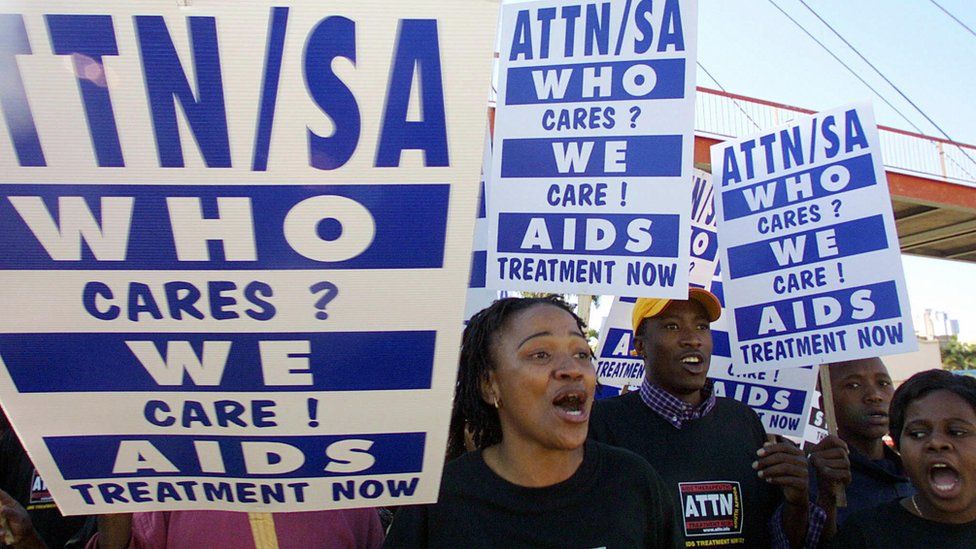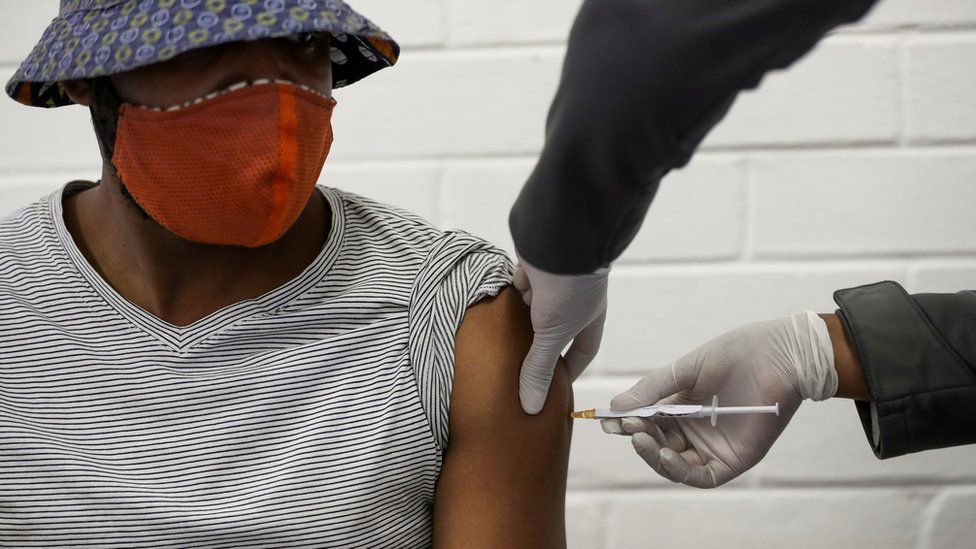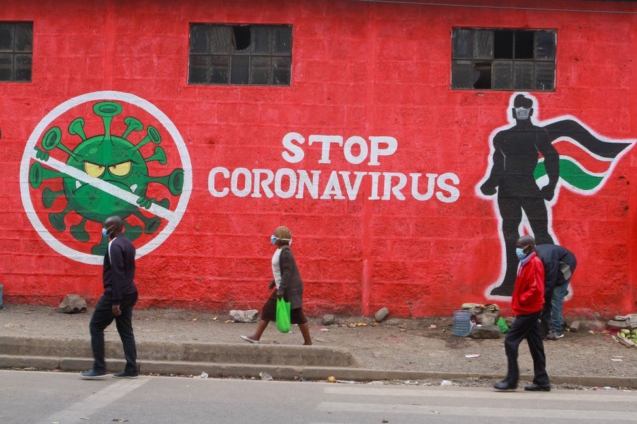Africa will have to wait "weeks if not months" before receiving Covid-19 vaccines approved by the World Health Organization, according to various officials working towards getting doses for the continent.
Close to 900 million doses have been secured so far through various initiatives, enough to inoculate about 30% of the continent's 1.3 billion people this year.
Hoarding by wealthy nations, funding shortfalls, regulations and cold chain requirements have slowed the process of rolling out the vaccines.
"The world is on the brink of a catastrophic moral failure and the price will be paid with lives and livelihoods in the poorest countries," warned WHO head Dr Tedros Ghebreyesus.
Calls for equity have been growing. Close to 40 million doses have been administered in at least 49 higher-income countries, compared to just 25 doses given in just one of the lowest-income countries, according to Dr Tedros.
"Not 25 million, not 25,000, just 25," he said, without saying which country.
So far, none of the main, Western vaccines has yet been administered in Africa, almost two months after the first doses were rolled out in Europe.
A coalition of organisations and activists dubbed The People's Vaccine Alliance found that "rich nations representing just 14% of the world's population had bought up more than half (53%) of all the most promising vaccines."
That included all of Moderna's vaccines for 2021 and 96% of Pfizer's expected production.
Canada topped the chart, according to the data by analytics company Airfinity, "with enough doses to vaccinate each Canadian five times".
Much of that demand has to be met before lower-income countries can have a turn.
'Don't look for super profits'
In Africa, the situation rekindles memories of the 1990s, when antiretroviral (ARVs) treatment for HIV/Aids was made in the United States.
Even though the continent had a much bigger population of people infected with HIV, it took at least six years before the life-saving treatment could be available for Africans.
Twelve million people died in Africa from Aids-related complications in a decade, even as mortality in the US dropped drastically, according to analyses by the Africa Centers for Disease Control and Prevention.

UNAids Executive Director Winnie Byanyima has been at the forefront of those calling for fairness from Covid-19 vaccine manufacturers.
"We're not asking them to make loses," she told the BBC. With the ARVs, it was pressure from people living with HIV and champions of the right to life that got governments to allow for the production of generic treatments which were much more affordable.
"The price [of antiretroviral treatment per person] dropped from $10,000 per year [per person] to just $100 per year."
She wants the same approach for the Covid-19 vaccine,urging the pharmaceutical industry "not to be driven by the desire for super profits".
They can still make profits even if they share their formulae, she added.
'Queue-jumping'
The WHO head is also calling for equity: "Even as they speak the language of equitable access, some countries and companies continue to prioritise bilateral deals, going around Covax, driving up prices and attempting to jump to the front of the queue," he said.

The Covax facility is an initiative of the WHO and the Vaccine Alliance to equitably distribute Covid-19 vaccines across the world.
"Most supply of the leading vaccines was pre-ordered by wealthy nations even before the safety and efficacy data was made available," said Dr Richard Mihigo, head of immunisation and vaccine development at the WHO Africa office.
Asked why Covax didn't do the same, he said securing funding was the first task the initiative engaged in. So far, $6bn has been raised out of a target of $8bn for 92 middle- and low-income countries, according to Thabani Maphosa of the Vaccine Alliance, Gavi.
So far, the facility has secured two billion doses for this group of countries, which includes all of Africa. Some 600 million are for the continent.
The African Union has made arrangements for member states to apply for $7bn funding from lenders, which would cover up to 270 million vaccines, according to its current chairperson, President Cyril Ramaphosa of South Africa.
'Mammoth operation'
But it is not just the purchase of vaccines that needs funding. Countries have also been ramping up their cold chains as they prepare for their arrival. These are especially important for the Pfizer vaccine, which must be kept at -70C.
The UN children's agency, Unicef, which usually deals with the distribution of childhood vaccines, will be handling the logistics of delivering Covid-19 vaccines under the Covax facility.
The agency is preparing to transport at least twice its usual capacity - what it calls "a mammoth and historic logistical.
But before it can be done, countries need to have ready infrastructure to receive and administer the doses.
Benjamin Schreiber, who is coordinating the Covax facility for Unicef, says he is "worried that we haven't resourced the roll-out and the preparation enough".
"What we're seeing in the roll-out in some of the high-income countries is that it's complicated, it needs to be resourced and properly planned, and there haven't been enough global resources to lower-income countries," he told the BBC.
In spite of the shortfalls, he paints a more optimistic picture of the continent's ability to introduce new vaccines.
"Africa has a lot more experience than many other regions - we've done so many vaccine introductions over the last 10 years and there's good expertise to organise targeted vaccination campaigns."
He adds that some countries that have dealt with Ebola also have expertise and ultra-cold chain experience and infrastructure.
Even before the pandemic hit, the organisation says it has been supporting cold-chain infrastructure in low-income countries, including the installation of 70,000 fridges, half of which are solar-powered.
The country-by-country status was not immediately available. Mr Maphosa from Gavi said countries were currently submitting documents to the facility to inform it of their readiness to roll out vaccines.
Only one vaccine approved by WHO
But even if they were ready, regulatory issues still stand in the way. Under the Covax facility, only WHO-approved vaccines can be bought.
So far, only Pfizer's has been listed for emergency use by the WHO. The process to approve Moderna and Astrazeneza vaccines is ongoing.
"Vaccines that are being recommended for emergency use need absolutely to meet minimum standards for safety and efficacy," said Dr Mihigo.
More developed countries such as the US and EU states have regulatory agencies that "complement" WHO's work and could therefore roll out vaccines without the body's approval.
However, in the developing world, many countries rely on the WHO to do the due diligence, adds Dr Mihigo.
That assurance of quality has a direct impact on people's willingness to take vaccines.
A study conducted by the Africa CDC and the London School of Hygiene and Tropical Medicine in the last quarter of 2020 found that a majority of Africans - four out of every five - would be willing to take a Covid-19 vaccine "if it was deemed safe and effective".
Several countries have however rolled out vaccines that have yet to be approved by the WHO. "Our advice is for countries to rely not just on the body's pre-qualification, but also any other competent 'Stringent Regulatory Authority'," said Dr Mihigo.
The Seychelles, Morocco and Egypt are administering the Chinese-made Sinopharm vaccine and Guinea, the Russian Sputnik V.
Africa CDC's director John Nkengasong said there were no negotiations going on to purchase these two vaccines, but that the regional body was "in talks" with the producing countries. More and more African countries are showing interest in these two vaccine candidates as the wait for the leading ones from the West continues.
Aids lessons 'not learnt'
The BBC could not establish a specific date from the official involved of when the Covax vaccines could be delivered to the continent. The most optimistic estimate was February but stretching to the end of March for the initial consignments of the Covax facility.
"We want to get the first doses out as fast as possible," said Unicef's Mr Schreiber.
The 270 million doses secured directly by the African Union are expected to be delivered from April.
No doses from WHO-approved vaccines are currently available for distribution on the continent.
"That lesson [from the HIV antiretroviral treatment] has still not been learnt," said Ms Byanyima from UNAids.
Latest Stories
-
EBID wins the Africa Sustainability Award
32 minutes -
Expansion Drive: Takoradi Technical University increases faculties
5 hours -
SHS heads demand payment of outstanding funds before reopening of schools
5 hours -
We thank God for the 2024 general elections – Akufo-Addo
6 hours -
Coconut Grove Beach Resort marks 30 years of excellence with memorable 9 lessons & carols service
6 hours -
WAFU B U-17 Girls’ Cup: Black Maidens beat Nigeria on penalties to win inaugral tournament
7 hours -
Real Madrid beat Sevilla to keep pressure on leaders Atletico
8 hours -
Liverpool put six past Spurs to go four points clear
8 hours -
Manchester United lose 3-0 at home to Bournemouth yet again
8 hours -
CHAN 2024Q: ‘It’s still an open game’ – Didi on Ghana’s draw with Nigeria
8 hours -
CHAN 2024Q: Ghana’s Black Galaxies held by Nigeria in first-leg tie
9 hours -
Dr Nduom hopeful defunct GN bank will be restored under Mahama administration
9 hours -
Bridget Bonnie celebrates NDC Victory, champions hope for women and youth
10 hours -
Shamima Muslim urges youth to lead Ghana’s renewal at 18Plus4NDC anniversary
11 hours -
Akufo-Addo condemns post-election violence, blames NDC
11 hours

